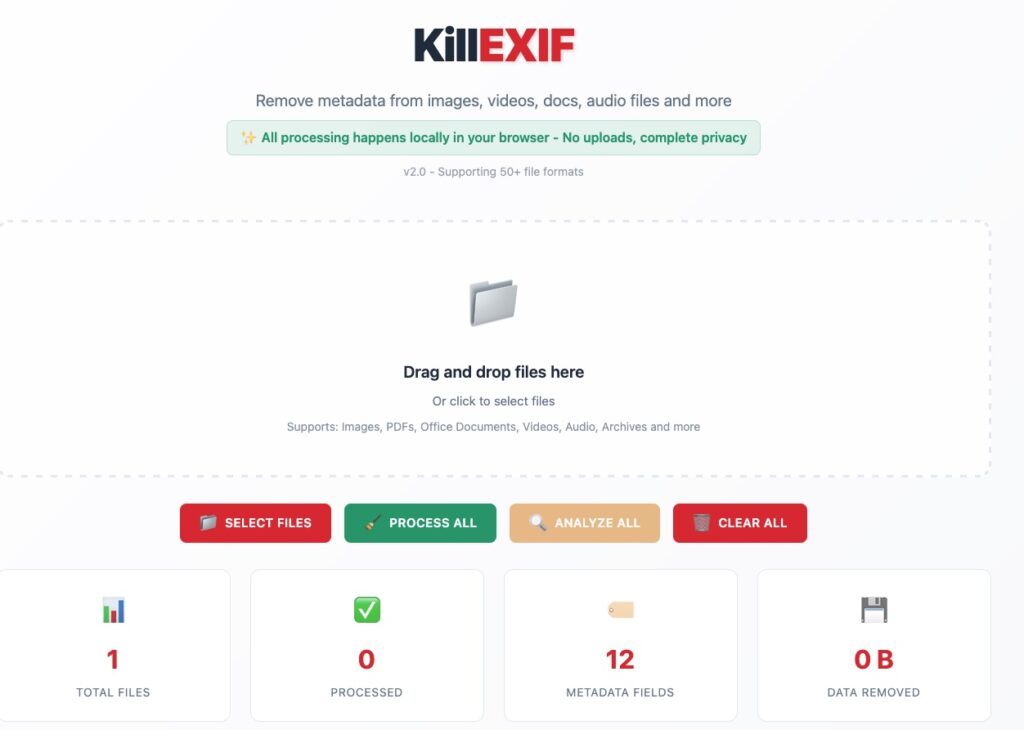A Spanish technology company has launched KillEXIF, a browser-based tool designed to help organizations and individuals remove potentially sensitive metadata from digital files without uploading them to external servers.
The Growing Metadata Privacy Concern
Digital files contain far more information than most users realize. Every photograph taken with a smartphone can include GPS coordinates pinpointing the exact location where it was captured. Office documents often contain revision histories, author names, and even fragments of deleted content. Video files may store device serial numbers and recording timestamps.
This metadata has become a significant privacy and security concern for organizations. “We’ve seen cases where employees accidentally shared confidential location data through seemingly innocent photo uploads, or where document metadata revealed internal corporate processes that weren’t meant to be public,” explains a cybersecurity researcher who requested anonymity.
Recent privacy incidents have highlighted these risks. In 2019, a major social media platform faced scrutiny when it was discovered that photo metadata was being used to track user movements. Military personnel have been advised against using fitness tracking apps that could reveal base locations through exercise routes.
A Local Solution to a Global Problem
KillEXIF, developed by Color Vivo Internet, takes a different approach to metadata removal. Unlike cloud-based services that require users to upload files to remote servers, the tool processes everything locally within the user’s web browser.
“The fundamental principle was to never require users to trust us with their sensitive files,” says the development team. “Everything happens on the user’s device, which eliminates the primary security concern with metadata removal tools.”
The application supports over 50 file formats, including common image types (JPEG, PNG, HEIC), office documents (PDF, Word, Excel), video files (MP4, AVI, MOV), and audio formats (MP3, FLAC, WAV). Users can process multiple files simultaneously and download cleaned versions with all metadata stripped.
Technical Innovation Behind the Tool
The browser-based approach represents a significant technical achievement. Traditional metadata removal often requires specialized desktop software or cloud services with substantial server infrastructure. KillEXIF accomplishes the same task using modern web technologies, including JavaScript libraries specifically designed for metadata manipulation.
The tool provides detailed analysis before removal, showing users exactly what information is embedded in their files. This educational component has proven particularly valuable for organizations training employees about digital privacy.
Processing happens entirely client-side using libraries like ExifReader for image metadata, PDF-lib for document processing, and custom algorithms for video and audio files. The application requires no plugins, downloads, or account creation.
Growing Adoption Across Sectors
Since its launch, KillEXIF has gained traction across various sectors. Educational institutions use it to teach digital literacy and privacy awareness. Legal firms employ it to sanitize documents before sharing with external parties. Healthcare organizations have adopted it to ensure patient privacy when sharing medical imagery.
The tool has been translated into 15 languages, reflecting its international user base. Government agencies in several countries have reportedly evaluated it for internal use, though specific details remain confidential.
“We’re seeing adoption in environments where data sovereignty is critical,” notes a digital privacy advocate familiar with the project. “Organizations that can’t risk sending files to third-party services finally have a viable alternative.”
Industry Context and Competition
The metadata removal market has traditionally been dominated by desktop applications and cloud-based services. Desktop tools often require IT department approval and software installations, creating barriers to widespread adoption. Cloud services, while convenient, inherently require users to trust external providers with potentially sensitive data.
KillEXIF’s browser-based approach sidesteps both limitations. Users can access it immediately without installation, while files never leave their devices. This positions it uniquely in a market increasingly focused on privacy-by-design principles.
Commercial competitors include desktop applications like ExifPurge and MetaClean, which typically cost $30-50 per license. Cloud-based services like PhotoPrivacy and ImageSanitizer charge monthly subscription fees but require file uploads. KillEXIF’s free, browser-based model represents a significant shift in the market approach.
Privacy and Security Implications
Cybersecurity experts have generally praised the local processing approach. “Any tool that reduces the need to send potentially sensitive files to external servers is a step in the right direction,” says Dr. Maria, a privacy researcher at the European Digital Rights Foundation.
However, experts also note limitations. Browser-based processing may be slower for very large files, and users must trust that the tool actually performs as advertised since the processing happens locally and can’t be independently verified in real-time.
The tool’s open approach to its technical implementation has been well-received by the security community. All processing libraries are standard, open-source components, and the metadata removal techniques are based on established industry standards.
Looking Forward
As privacy regulations like GDPR and CCPA continue to evolve, tools for managing personal data in digital files are becoming increasingly important. The success of browser-based approaches like KillEXIF may signal a broader shift toward client-side privacy tools.
The development team indicates they’re working on additional features, including support for more specialized file formats and enhanced analysis capabilities for enterprise users. They’ve also hinted at potential API development for organizations wanting to integrate similar functionality into their own applications.
For now, KillEXIF remains freely available at killexif.com, continuing to serve users who need to clean their digital files without compromising on privacy.
The tool can be accessed directly at KillEXIF and requires no registration or software installation.

